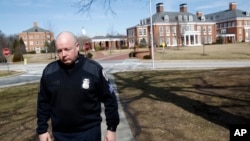Student Union
New in the Glossary of Confusing Words: Might/May, Scared/Afraid, Called/Known As
So here are three more pairs of words for you!
Might/May
These words were submitted to the Glossary by two different people. One of them asked:
"My child may have been killed by a car". Is she uncertain as to the fate of her little lamb, or has she rescued the capering young goat in the nick of time?
Both “might” and “may” express uncertainty and possibility. In the example above, the women does not know whether or not her child has been killed by the car. And she equally could have said, “My child might have been killed by a car” to express the same thought.
Some grammar sticklers might (or may!) say that “may” is used for the present tense and “might” for the past tense, but as far as I know, people don’t really observe that distinction – not even in formal writing.
Scared/Afraid
This word pair was also submitted twice. One of the people who suggested it asked which of these two sentences would be correct:
I was scared to go into the _____.
I was afraid to go into the _______.
In this example, scared and afraid are complete synonyms, and both sentences are correct. To be scared or afraid is to be frightened.
The second person who submitted these words noted:
I almost never hear or see the word afraid used on TV or in written work any more. It is almost like writers today have forgotten on never learned the word afraid. Have you noticed this as well?
I don't know about that, but it is probably more common to use "scared" than "afraid" when expressing fear. It just comes off sounding a bit less formal.
You can also use the word “afraid” to express regret or apology. In that case, the word “scared” is not a synonym.
“I’m afraid I have some bad news.”
Called/Known As
“Called,” “known as” and “named” are all ways to identify someone or something. This is a case where the British usage is different than the American one, so if you’ve learned British English, pay attention.
Compare these three sentences:
1) “The teacher is named John.”
2) “The teacher is called John.”
3) “The teacher is known as John.”
In American English, only the first sentence says definitively that the teacher’s name is John.
Unlike in British English, where "named" and "called" are synonyms, in American English, the second sentence could suggest that John is not his real name (“His name is Jonathan, but he’s called John.”). The third sentence would certainly suggest that John is not his real name.
For inanimate objects, it's more common to use "called" when identifying something. "Named" would only be used in cases where something has an official or legal name, and even then it's usually interchangeable with "called."
“It’s called a Philips head screwdriver.”
"The song is called Tonight."
“I'm calling my company the Voice of America.”
"I'm naming my company the Voice of America."
But even with inanimate objects, "known as" would imply that you're giving a nickname or colloquial name rather than its actual name.
Have a word to suggest for our Glossary of Confusing Words? Leave your submissions in the comments, or use the form below.
Loading...
See all News Updates of the Day
Universities in Middle East building research relationships with China

As China bolsters research relationships with universities in the Middle East, the United States has taken notice – especially when that research involves artificial intelligence.
Reporting for University World News, Yojana Sharma has the story. (March 2024)
Tips for staying safe while studying in the US

Recent news events have raised safety concerns among some international students studying in the United States.
Adarsh Khandelwal, writing in the India Times, has tips for staying safe from the moment you arrive until the day you complete your studies. (March 2024)
Some colleges are making digital literacy classes mandatory

A 2019 study by Stanford found that most college students can’t tell the difference between real and fake news articles. Amid rampant online disinformation, and the threat of AI-generated images, some schools are making students learn “digital literacy” to graduate.
Lauren Coffeey reports for Inside Higher Ed. (March 2024)
With federal student aid delays, students aren’t sure what college will cost

The U.S. Department of Education’s federal student aid form (FAFSA) experienced serious glitches and delays this year.
Now, many students have been admitted to college, but don’t know how much money they’ll need to attend.
Read the story from Susan Svrluga and Danielle Douglas-Gabriel for The Washington Post. (March 2024)
Senator draws attention to universities that haven’t returned remains

More than 70 U.S. universities continue to hold human remains taken from Native American burial sites, although those remains were supposed to be returned 30 years ago.
Jennifer Bendery writes in Huffington Post that one senator has been using his position in an attempt to shame universities into returning remains and artifacts. (April 2024)







